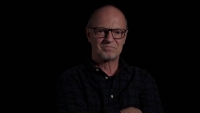My parents´fate was a fortunate exception
Actor Hanuš Bor was born on December 26, 1950 in Prague. Both of his parents were Holocaust survivors. Father Pavel Bor, whose original name was Edelstein, fled with his brothers from the Protectorate in 1940 and reached the Palestinian shores on a steamer together with other Jewish refugees. There he experienced the explosion on the ship Patria, on November 25, 1940. He later enlisted in the Czechoslovak unit within the British army and took part in the battles of Tobruk and El Alamein. Hanuš´s mother Gerta Finková came from a Jewish Czech-German family in Sokolov. In 1942, she and her family were transported to the Terezín ghetto, where she managed to survive until the end of the war thanks to the protection of a German office worker whom she had known before. However, the rest of her family perished, as did father’s relatives who remained in the Protectorate. The parents met in 1946, and apart from Hanuš, they also had a daughter. The witness has acted in many films and theatrical productions since preschool age. He first appeared on screen in Zbyněk Brynych’s film Žižkov Romance (1958). He passed the leaving exams at the Jan Neruda Grammar School in Hellichova Street in Malá Strana, and in 1969 he started his studies at DAMU [The Academy of Performing Arts in Prague, trans.], where his tutors were Václav Voska, Vlasta Fabiánová and František Salzer. In 1973, he joined the theatre in Liberec, where he remained until 1990. In Liberec, he married his first wife, the actress Milena Šajdková. They had two daughters, Eliška and Magdaléna. In November 1989 he was a member of the Liberec Theatre strike committee. At the same time he also met his current wife, playwright Jolana Součková. At the beginning of the 1990s, he left for the Alfa Puppet Theatre in Pilsen, and a year later he found employment in the ensemble of the newly founded Labyrinth Theatre (in the building of the former Realistic Theatre, today’s Švandovo Theatre in Smíchov). Since 2007 he has been a member of the ABC Theatre ensemble within the Municipal Theatres of Prague. He has acted in many films (e.g. Hanele, directed by Karel Kachyňa) and television series.
